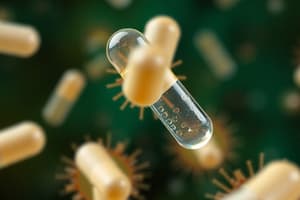Podcast
Questions and Answers
Penicillin was discovered by Scottish scientist Alexander Fleming in 1925.
Penicillin was discovered by Scottish scientist Alexander Fleming in 1925.
False (B)
Penicillin works by stimulating the synthesis of the bacterial cell wall.
Penicillin works by stimulating the synthesis of the bacterial cell wall.
False (B)
Natural penicillins are derived from the E. coli bacteria.
Natural penicillins are derived from the E. coli bacteria.
False (B)
Penicillin is effective against viruses.
Penicillin is effective against viruses.
Penicillin is used to treat fungal infections.
Penicillin is used to treat fungal infections.
Penicillin was first isolated by a French scientist.
Penicillin was first isolated by a French scientist.
Semisynthetic penicillins are modified from natural penicillins.
Semisynthetic penicillins are modified from natural penicillins.
Penicillin is effective against all types of bacteria.
Penicillin is effective against all types of bacteria.
Piperacillin is a natural penicillin.
Piperacillin is a natural penicillin.
Penicillin is used to treat bacterial infections, including pneumonia and meningitis.
Penicillin is used to treat bacterial infections, including pneumonia and meningitis.
Flashcards are hidden until you start studying
Study Notes
Discovery and History
- Penicillin was discovered by Scottish scientist Alexander Fleming in 1928
- Fleming observed that a mold (Penicillium notatum) had contaminated one of his bacterial cultures, and that the mold had killed off the surrounding bacteria
- He isolated the substance responsible for this effect, which he named penicillin
Mechanism of Action
- Penicillin works by inhibiting the synthesis of the bacterial cell wall
- It does this by binding to and inhibiting the activity of an enzyme called DD-transpeptidase
- This prevents the bacteria from forming a rigid cell wall, ultimately leading to the death of the bacterial cell
Types of Penicillin
- Natural penicillins: derived from the Penicillium mold, these include penicillin G and penicillin V
- Semisynthetic penicillins: modified from natural penicillins, these include ampicillin and amoxicillin
- Synthetic penicillins: completely man-made, these include piperacillin and ticarcillin
Uses and Effects
- Penicillin is used to treat bacterial infections, including pneumonia, meningitis, and septicemia
- It is effective against a wide range of bacteria, including Staphylococcus, Streptococcus, and E. coli
- Common side effects of penicillin include allergic reactions, diarrhea, and nausea
Resistance and Limitations
- Overuse and misuse of penicillin has led to the development of antibiotic-resistant bacteria
- Penicillin is not effective against viral infections, fungal infections, or parasitic infections
- Patients with a history of allergies or asthma may be more likely to experience adverse reactions to penicillin
Studying That Suits You
Use AI to generate personalized quizzes and flashcards to suit your learning preferences.




